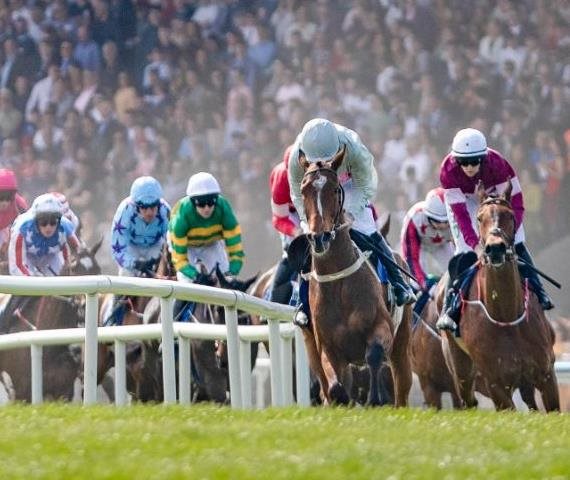Working in racing


Would you like to work in the racing and breeding industry?
Many people are curious about the various roles in the racing industry but are unsure of the right career to suit their skills. Horse racing and breeding employs over 10,000 people in Ireland and that figure is steadily growing. People make careers for themselves as jockeys, sports journalists, bloodstock agents, sports betting, horse welfare and trainers and many more, utilising their natural strengths as well as learning new skills to take them down the employment path they’ve been craving.
At Equuip, we want to help you on your career journey and so we have compiled a complete career list below, outlining the many varied roles within the racing industry. If you have any questions on how to pursue these roles, or where to find education and training in the horse racing industry, check out our page on Equine Courses & Education or email us equuip@hri.ie
Careers in the equine industry
The role of a bloodstock agent is to buy and sell horses on behalf of their clients at both public auction and privately when required. A bloodstock agent must have extensive knowledge on thoroughbred pedigrees, racing form, and conformation. This role involves working closely with breeders, trainers and owners.
A farrier is responsible for equine hoof care. Main duties include shoeing, trimming, correcting and assisting with various hoof ailments and it is a physical role. A farrier will be required to have knowledge of equine anatomy, physiology, practical forging techniques, and therapeutic shoeing. To become a farrier you have to serve a four-year apprenticeship under the guidance of the Irish Master Farriers Association.
Ground staff work as part of a racecourse team to ensure that the race track is kept in premium condition; this will involve applying nutrients or pesticides as required, cutting the grass, dealing with issues caused by the weather such as a waterlogged track. On race days ground staff will replace divots after each race, they will also carry out any emergency repairs of rail or track as required. On National Hunt racedays this will include repairing hurdles and fences damaged by horses during a race.
The Head Lad/Lass is responsible for the smooth day-to-day running of a stable. This includes staff management, and general care of thoroughbreds including exercising and feeding. In many cases a Head Lad/Lass will have started out as a stable staff member and have attained a promotion by displaying the necessary management and leadership qualities. This role holds a lot of responsibility and being a good communicator is essential as you will be dealing with staff, owners, vets, farriers etc. To be successful in this role you must have excellent leadership, organisational, and horsemanship skills and be able to perform under pressure.
The role of a horse box driver involves the transportation of horses. A horse box/lorry driver must hold a current, clean HGV licence, and an Equine Transport licence. A certificate of competence is mandatory for anyone transporting horses for distances of more than 65km.
A Jockeys Valet will work for jockeys at a race meeting. They are responsible for preparing the riders’ gear between races. As a jockey can be riding for a number of different owners on a race day this will involve ensuring that the right silks are ready and that boots and breeches are clean and presentable.
The primary role of a jockey’s agent is to book mounts for the riders that they represent. Securing mounts involves maintaining relationships with racehorse trainers, evaluating races to determine the rider’s best available opportunities, and scheduling the rider so that they will be in a position to compete in as many races as possible. Jockey agents are also responsible for a variety of administrative tasks such as scheduling interviews and appearances, keeping track of expenses and income, and managing most aspects of the jockey’s business affairs.
Please click here to view a detailed role specification.
A nominations executive works for a stud farm. The role involves booking mares to the stallions that stand at the stud. The role will involve building good relationships with breeders, advising clients on pedigrees, and promoting the stallions by keeping abreast of how their progeny are performing on course around the world. The role will involve a lot of travel during the sales season as the nominations executive will be expected to be in attendance as a representative of their stud farm.
A racecourse operations manager will be responsible for the smooth running of a race day, they will liaise with all on course service providers, ground staff, and race day staff to ensure everything is running to plan. The operations manager will also deal with any problems or issues as they arise.
A point-to-point handler is a trainer who can only run their horses in point-to-point meetings.
A racing secretary is usually the first point of contact in a racing stable. To be a racing secretary you must have strong organisational skills, interpersonal skills, excellent communications skills, and a good understanding of the racing industry. Duties will include making entries and declarations, liaising with owners, setting up new partnerships, accounting, and wages.
A racecourse manager is in charge of a specific racecourse and will be concerned with ensuring that the racecourse is run as a profitable business. While racing is the core activity for the racecourse, the manager will always be looking for alternative revenue streams to ensure the business is in a healthy financial position. Alternative uses can include renting the facilities out for conferences when there is no racing taking place, or renting the site out to hold a music festival, as both Fairyhouse and Punchestown have done successfully in the past.
The role of a racehorse trainer is to train thoroughbred horses to win races. However the role encompasses a host of other activities which will include the welfare and safety of both the staff and horses in a stable, liaising with your various owners and keeping them up to date regarding their horse, the daily routine of the racehorse, and picking suitable races for the horse. This is a high pressure, fast-paced and exciting role. Trainers must be good communicators and have a thorough understanding of the fundamental principles of training racehorses.
A race day vet will be employed by the racecourse on race days to provide veterinary advice to stewards on the health, welfare and fitness of the racehorses that are due to run. They will also deal with any injuries that may arise on the day. To work as a vet in Ireland you must have a degree in Veterinary Medicine, which is registered by the Veterinary Council of Ireland. UCD’s Bachelor of Veterinary Medicine (MVB) is Ireland’s only such degree.
Please click here to view a job specification for an equine vet.
The assistant vet will deal with the collection of blood and urine samples from the winning horses post-race. They must comply with all laboratory protocols and procedures. The assistant vet will also check that all vaccinations are in order.
A stallion handler is responsible for looking after stallions on a stud farm. Duties include the day-to-day care of the stallion, assisting the stallion and mare during the mating process, and the presentation of the stallion on open days and for potential clients. A stallion handler may also get the opportunity to travel abroad if the stallion shuttles to the southern hemisphere during the breeding season (the northern hemisphere breeding season runs from Mid-February to July and the Southern Hemisphere season runs from mid-August to January).
A stall handler’s role is to load the correct horse in its designated stall prior to the off of the race. Their responsibility also includes the safety of both horse and rider in the stalls.
A stud groom will have many extra responsibilities to those of a stud hand such as the welfare of the horses, feeding, liaising with the vet and farrier, teasing and covering, attending to mares and foals during and after foaling, maintaining the stud records, supervising and liaising with staff. He/she is an essential part of the stud’s work force and taking responsibility for the well-being of valuable bloodstock can be a particularly rewarding career.
The stud manager is responsible for the horses, promotion and marketing of the stud farm. The role is mainly office-based as primary duties include overseeing the accounts, selecting and purchasing stallions and mares, and liaising with owners. Working closely with the stud groom, the stud manager will also be responsible for the management of the staff.
Please click here to view a detailed role specification.
An assistant trainer will assist the trainer in planning race entries, assessing a horse’s ability, completing racing documentation, recruiting and training stable staff, as well as acting as the trainers’ representative at the races when necessary.
The role of the travelling head lad/lass is to travel to the race meetings with the horses and to ensure that the race day runs smoothly. Duties will include organising racing gear for the day ahead, ensuring all equipment is clean and in good working order, preparing the horse for travelling, and turning out the horse at the races to an excellent standard.
The role of the work rider is to exercise the racehorses particularly in their fast work. They must be accomplished riders with excellent communication skills and they must also be able to follow instructions to the letter.
Yard staff are the people who work in a racing stable but remain on the ground. Duties will include mucking out, feeding, grooming, saddling up, putting horses on the walking machine, and taking care of the horse after exercise. Having a working knowledge of machinery such as tractors etc. would be an advantage in this role.
Please click here to view a detailed role specification.
Are you ready for the next step?